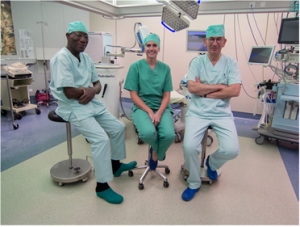Jun 19 2014
Leading surgeons at the University Hospital Dinant Godinne completed the world’s first robotic-assisted surgical procedures with the Medrobotics’ Flex® System. The surgical team of Prof. Marc Remacle and Prof. Georges Lawson successfully performed procedures on two patients, which included the ablation of a vocal fold angiectatic polyp and the resection of tongue-based lymphoid tissue (lingual tonsil).
 Professor George Lawson, Sandy Leman, INF & Professor Marc Remacle immediately following the use of the Flex® System, a first of its kind flexible robot system. (Photo: Business Wire)
Professor George Lawson, Sandy Leman, INF & Professor Marc Remacle immediately following the use of the Flex® System, a first of its kind flexible robot system. (Photo: Business Wire)
The first patient had a chronic hoarseness induced by a polyp on the vocal fold. The lesion was benign and couldn’t be cured by speech therapy or medical treatment. The patient returned home on the same day of the surgery.
The second patient had severe snoring, without apneic problems. The base of tongue and palatine tonsils were localized as the main cause by a previously done sleep endoscopy. The patient was discharged from the hospital one day after surgery.
The Flex® System, designed and manufactured by Medrobotics Corporation, enables surgical procedures where conventional line-of-sight technologies are either not feasible or sub-optimal. Surgeons can navigate the Flex® System around anatomical structures to hard-to-reach locations through a single access site, and then use the onboard high-definition vision system to precisely deploy flexible surgical instruments. The uniquely “wristed” 3mm Flex® Instruments enable the surgeon to operate in confined spaces, further extending his or her reach to important and often challenging areas of the anatomy.
“With other approaches, surgeons sometimes cannot achieve the access and visualization that they desire minimally invasively.” said Prof. Remacle. “With the Flex® System, we can more easily access and treat patients with challenging anatomy.”
Minimally invasive surgery has demonstrated advantages for patients and providers compared to traditional open procedures, decreasing hospital stays and recovery times. The Flex® System was designed to provide an affordable, easy-to-use robotic-assisted surgical platform for hospitals and surgeons seeking to provide minimally-invasive treatment options to the broadest number of patients.
About University Hospital Dinant Godinne-UCL Namur
University Hospital Dinant Godinne is based in Belgium and employs a total of 2,700 staff members. With a capacity of 605 beds, University Hospital Dinant Godinne is committed to providing patients with top-quality, dependable, easily accessible care with the most advanced technologies.
The close association with the health sector of Université catholique de Louvain (UCL) assigns to the hospital three missions:
- Providing patients with high level medical care
- Supporting research
- Guaranteeing medical education that covers all fields
About Medrobotics
Medrobotics Corporation (www.Medrobotics.com) is a privately-held company headquartered in Raynham, Massachusetts that manufactures and markets the Flex® System, a robotic-assist platform that provides surgeons with single-site access and visualization of hard-to-reach anatomical locations. The Company’s vision is to provide more patients with access to minimally invasive surgery. Medrobotics recently received the CE mark for its Flex® System, which is available on a limited basis in Europe. These products are not currently approved for sale in the U.S.
Source: http://www.medrobotics.com/